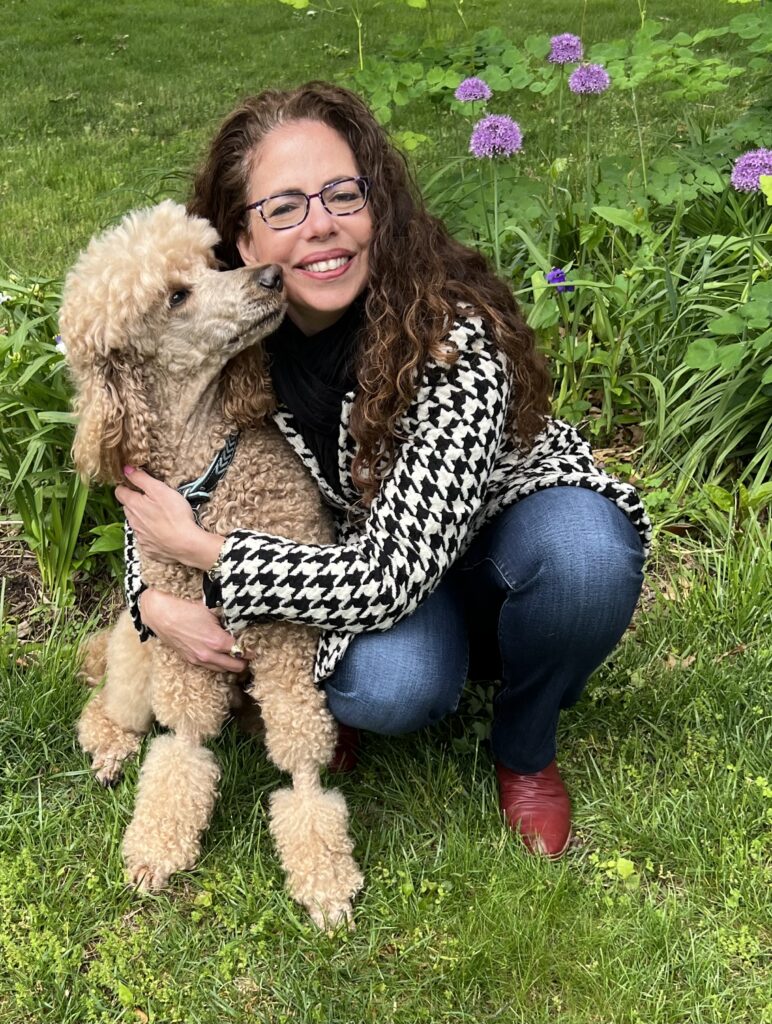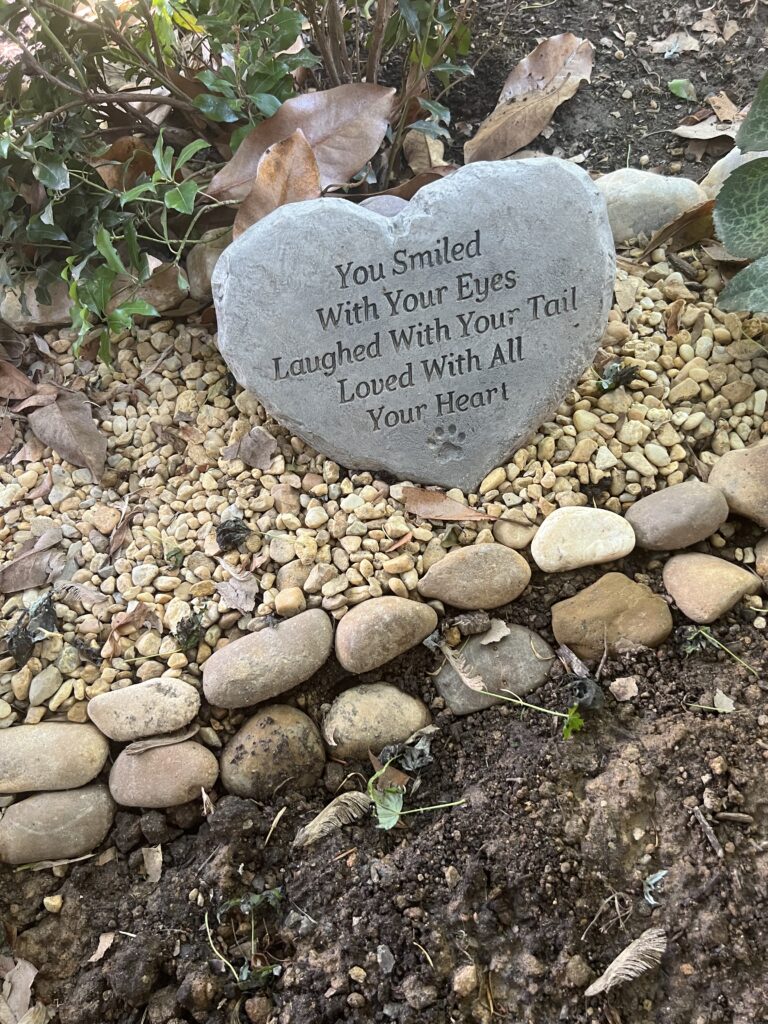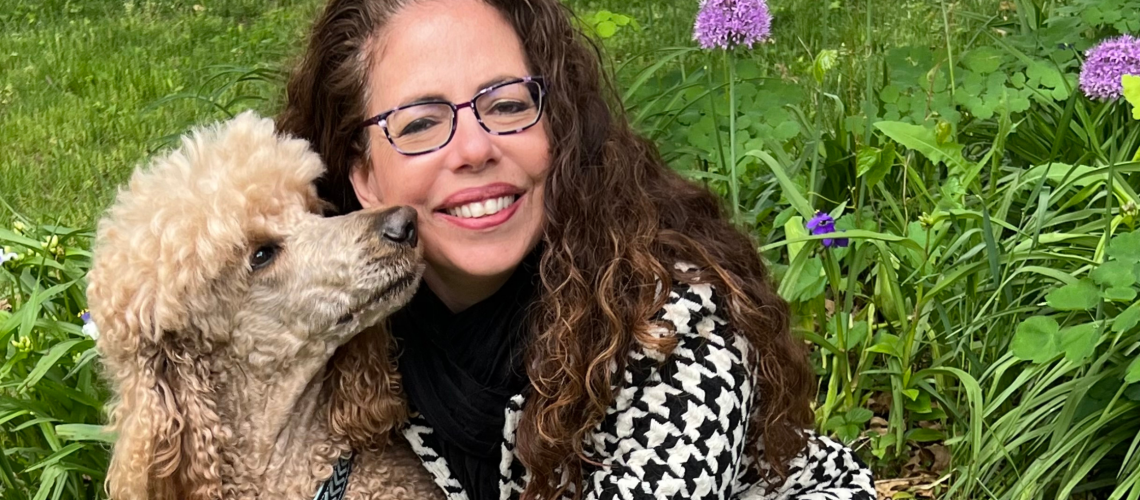“When you love so deeply, pain hurts more.” That’s what my husband said to me after our beloved red standard poodle, Tigger, passed away from an aggressive cancer just two weeks ago. You may remember Tigger – he was in almost every video I produced. Parents and 2e adult clients who met in person, lay on the floor with him after our sessions, or pet him while we discussed their challenges and needs. Tigger provided peace and helped soothe my heart when my much-loved father passed away. He provided meaningful outside breaks and kept me walking while I wrote my book. He was a steady presence filled with love who was usually no more than three feet away from me at any given time. The way I bond with humans and animals is the perfect example of pleasure and pain caused by emotional overexcitability, and especially in the case of loss, why self-awareness, self-acceptance, and self-love are key for a 2e person to find joy once again in life.
Self-Awareness
The emotional overexcitability that 2e people experience is often defined by neurotypical people as “overly sensitive” or being self-centered. How could someone take up so much room and fill the space, they wonder. They must want attention or not recognize how they are behaving. When in fact, the 2e person is wondering how others don’t understand their deeply organic and physiological feelings. They often feel shame for the intensity of their emotions and reactions. At the same time, when someone demonstrates empathy toward a 2e person, when a 2e person feels seen and understood, they are immeasurably appreciative. Maybe that’s one of the reasons 2e people bond so deeply with their pets – it is with them that the 2e person can be their true self.
When Tigger passed away, we wanted to create a special zen/meditation space in his honor. I went to the local quarry and purchased Tigger-colored stones to place in front of our porch where he loved to keep watch over our street. The local quarry is populated by enormous trucks and loud machinery. As I purchased bags to fill with burnt sienna-colored stones, I shared with the clerk the reason I was buying those stones. As I shared, I was thinking to myself, “Why did I just say that? He probably thinks I’m crazy!” Instead, he looked me in the eye and genuinely gave me his condolences. His colleague overheard and happened to have his puppy with him that day and asked if I’d like to meet him. I did. It was the first pair of puppy eyes I looked into since my sweet boy passed. And it wasn’t awful. It was therapeutic.
These strangers, working in a world completely different from mine, allowed me to be my authentic self. Boy was I grateful. I was so appreciative that I went home, grabbed some of Tigger’s treats and brought them back to the quarry for that sweet puppy. Above all I was thankful that my inability to contain the thoughts in my head – that I was creating a memorial for my beloved pup – was met with empathy and understanding (not eye-rolling and questioning).
Self-awareness in 2e people can lead to over-compensating and masking. I might have kept my thoughts to myself assuming the clerk’s feelings and reactions would include skepticism or even hostility. Oftentimes twice exceptional people second-guess, try to hide, or even admonish themselves for feeling their feelings. These responses lead to deep-seated frustrations and diminished self-confidence. Instead, 2e people must learn to accept themselves. Sure, it’s important to consider how behaviors might affect others. If your reaction presents like a sonic boom rather than a slow burn, maybe you engage in self-care before interfacing with others during those intense times. But otherwise, grab ahold of your genuine self and JUST BE YOU.
Self-Acceptance
When twice exceptional people understand and are aware of their true selves, they begin to accept who they are, and open space to feel self-love. 2e children and adults are frequently taught that they need to be “more” or “less” – these sentiments work against self-acceptance, and ultimately self-love. It’s not that the 2e person should ignore such feedback, but rather than accepting these deficit focused comments, the 2e person does well to consider the reasoning behind their big emotions. Likely it has something to do with valuing fairness, justness, empathy, or loyalty.
To accept oneself a person must understand the origin of their nature. The “why” is important to 2e people and helps to stop masking and start living an authentic life. When Tigger became ill, I purposely scheduled “out of office” time to be with him. When he passed, my team helped rearrange my schedule so there were fewer interactions requiring deep empathy. Knowing myself, I had to shelter my heart so I could fully grieve. I needed time to practice self-love and I knew this because I allowed myself to be self-aware.
Self-Love
Loving oneself means understanding and accepting your decisions and reactions. It doesn’t mean the person no longer grows or changes. It just means the person is aware of the why behind their reactions and behaviors and has found ways to integrate, not despite, but because of who they are.
My book, Gifted and Distractible: Understanding, Supporting, and Advocating for Your Twice Exceptional Child, publishes October 17, 2023. In the last line of my book bio, it states, “Julie’s therapist is a red standard poodle, named Tigger.” I decided to keep that line in my book. Tigger provided such comfort and stability while I was doing the intensive work of writing, that I wanted to honor him in that way. The line was initially intended to provide humor within the truth of Tigger’s importance in my writing process. Publicly expressing love for Tigger posthumously and allowed me to practice self-love as I acknowledge his importance in my life.
I also decided to change my author photo from a professional headshot to the endearing photo of Tigger and me that accompanies this blog. Giving myself permission to be me and to meet my needs in this way, cushions my deep feelings of mourning and loss.
It’s not in every situation that twice exceptional people can feel and demonstrate self-love like this. Of course, there is self-doubt and pausing to consider one’s behaviors. But once a person has the knowledge, understanding, and grasp of “the why,” they are well on their way to accept who they are and find ways to express love for themself. My hope for twice exceptional people everywhere is that they stop wishing that others would treat them better and begin treating themselves with proper respect, understanding, and above all … love.



Author: Julie F. Skolnick M.A., J.D.
Julie Skolnick, M.A., J.D., is the Founder of With Understanding Comes Calm, LLC, through which she passionately guides parents of gifted and distractible children, mentors 2e adults, and collaborates with and advises educators and professionals on bringing out the best and raising self-confidence in their students and clients.


4 Responses
What lovely ways to honor your sweet dog and yourself in the process. And what inner strength it takes to share vulnerability! From one 2e to another, I thank you. The world needs this kind of strength. ❤️ Sending you wishes for peace and comfort.
Thank you for your virtual hug, Holly.
Beautifully written and our family understands completely. Sending our thoughts and prayers and thank you for writing this so I can share with my kids. ♥️🐶
Thank you Kathy. I’m so glad it will be meaningful to your kids. Pets are so important for 2e people – emotional, sensory, loyalty, deep connection…Your love and understanding is most appreciated.